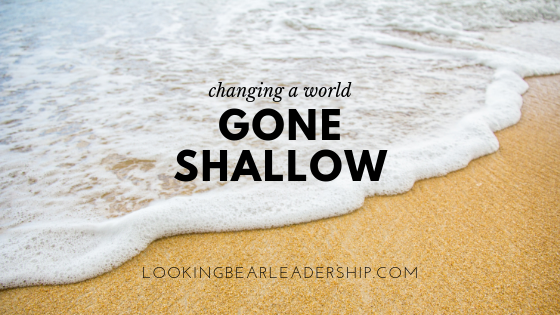Changing A World Gone Shallow
Once a third person had said it, I knew it needed to be addressed.
“Sorry I’m crying, I didn’t know this story was so emotional for me” she said before finishing her introduction.
I was facilitating a graduate course on the practice of Transformational Leadership, and our opening time together was spent sharing our names, their meaning, and whatever we knew about how we were given our name. It was part of long, slow introduction that stretched out to an intentional 90 minutes or so.
As we began, a few people were surprised by the emotion they felt upon sharing their name in this way, as it brought to life for them their personal story and their relation to family, culture, and history. And in an almost involuntary response to displaying that emotion, people felt the need to apologize for their vulnerability.
It’s an apology that is common in our culture that privileges a veneer of impenetrability and blushes at or even attacks vulnerability. The lyrical lamentation of José González’s beautiful song “Stay Alive” captures the essence of these pressures:
There’s a rhythm in rush these days
Where the lights don’t move and the colors don’t fade
Leaves you empty with nothing but dreams
In a world gone shallow
In a world gone lean
Yet, for all the lamentation about the lack of depth or sense of connection in our communities right now, there is surprisingly little done to interrupt the patterns of shallowness.
That’s why when a second, and then third person apologized for the tears that telling their story dislodged I gently intervened. “I am noticing a pattern in our conversation already where we are apologizing for crying. But that is not something to apologize for – it is an honor for us to be present to your honest emotions, whatever they are because we live in a world that usually convinces us to withhold our true selves. So, from now on, if you begin to cry do not apologize but instead say to us, ‘you’re welcome.’”
People laughed and the point was made with little expectation that it would actually become a practice. But to the group’s delight, a few minutes later, when the next person found themself overcome by some deep part of their brief telling, they managed to squeak out between gasps a strong, “you’re welcome!”
We all laughed and clapped and thanked them, and the dignity of everyone in the room swelled.
There are so many lessons to be drawn from this story for me. The importance of names as a symbol of our stories, the power of affirmation of true self as a condition for hospitality, or the way two or three sentences can speak more loudly to a group than any long lecture could.
But I think I was most struck in this course at the way in which the participants took seriously the invitation and responsibility to co-create the kind of community space they desired and needed. When I prepare spaces for reflection and learning about the forces that change people and communities, I am keenly aware of the power that I do not have.
I cannot decide for people how they will respond to a prompt or with what depth they will consider a proposition. I spend hours thinking about and crafting the questions and activities that a learning space will gather around, and I prepare myself to make adjustments or throw-out the agenda as needed. But ultimately, any transformative space that I am designated to convene is dependent upon the desire and willingness for co-creation on the part of participants. I must trust them.
And I recognize that for those participants, it is a brave thing to meet me in that space with their whole selves and to risk being vulnerable in the way that invites transformative learning. But wow is it rewarding when we as facilitators and participants show up for each other.
That’s why the lesson I draw most from this story, is the one that comes from the participant who said, “you’re welcome” to the rest of us as they cried in front of a group of mostly strangers. They owned their story in that moment with a bravery that served the whole group just as it affirmed their personhood.
That is the bravery needed to transform “a world gone shallow” and “a world gone lean.” It is not someone else who will make the world richer, kinder, or more just. It is us. I’m thankful for all the many people who show me what that looks like everyday.
How do you affect the spaces you show up in with your willingness to participate? How is trust part of your process of lifelong learning? Whose co-creation are you grateful for?

